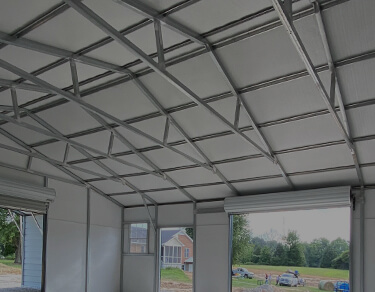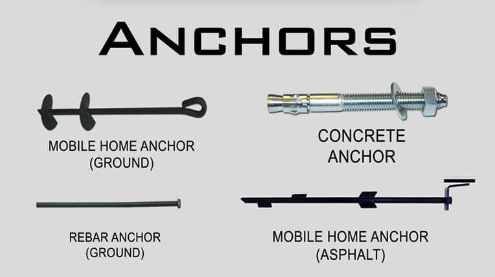
DIFFERENT TYPES OF ANCHORS FOR METAL BUILDINGS

Bulldog Steel Structures Has the Right Type of Anchor Bolts for Your Metal Building Many different types of anchors for metal buildings can be used for installing carports or prefabricated steel buildings. After all, the anchors keep the structure firmly secured to its foundation. Whether building an RV carport on the ground or installing a workshop onto a concrete foundation, your anchors are of utmost importance. Remember, your structure is only secured if the appropriate anchors are used to construct it.
What are the different types of anchors for metal buildings?
There are four primary types of anchor bolts for metal structures: Diagram of the different types of anchors for metal buildings: Mobile home anchor (ground), concrete anchor, rebar anchor (ground), and mobile home anchor (asphalt).
Rebar anchors: Commonly referred to as soil nails, these anchors are used to secure a structure to the ground temporarily. Ground anchors are not enough to ground certify a structure but will hold it in place until mobile home anchors are added.
Mobile home anchors: Commonly referred to as augers, these anchors are designed to keep a structure fastened to dirt or soil. In addition to the standard Rebar Anchor, Augers are driven into the dirt and attach well to the ground. To meet certified ground installation requirements, a combination of rebar and mobile home anchors must be used to install the structure.
Concrete anchors: Concrete anchors will work well if you pour a concrete base for your metal building. These anchors expand once installed, so it is recommended that the concrete foundation be slightly larger than the building and have a footer underneath the grade. g
Asphalt anchors: Designed exclusively for securing a building to asphalt, asphalt anchors do a great job because they don’t compromise the integrity of the asphalt.
TAKE THE NEXT STEP
Request a Quote TodayHOW DO YOU KNOW WHERE TO PLACE THE ANCHORS?
Regardless of the anchors you use, they must be placed appropriately. A certified carport or prefabricated steel building will come with blueprints for where the anchors should be installed.
Installers must follow these blueprints as closely as possible. Not only will this increase the durability and longevity of the structure, but it will also improve its overall safety.
Ground and concrete anchors must be installed within 6 inches of each upright. Mobile home and asphalt anchors must be installed every 20’ of the structure, with a minimum of one per corner and one on each side of any roll-up door opening or header bar.
WHAT TYPE OF FOUNDATION SHOULD THE ANCHORS BE SECURED TO?
Although any flat and level surface is acceptable. It is recommended you pour a concrete foundation. Most buildings will have a blueprint with minimum details required from a foundation. These details should be cross-referenced with the local building code official. If a local code calls for more than what the blueprints call for, the local code will override the requirements of the blueprint.
SIMPLE GUIDELINES FOR ANCHOR BOLTS
The following guideline is a basic overview of anchor bolt requirements for prefabricated steel buildings.- All steel buildings need at least four mobile home or asphalt anchor bolts or one every 20’ (whichever is greatest) if installed on the ground.
- A cement anchor or rebar anchor must be installed next to every upright.
- Concrete anchors should be installed through the middle of the base rail 6” from an upright.
- Most blueprints call for expansion concrete anchors to be 4” away from the edge of the concrete foundation.
- Exact concrete specifications will be listed on your blueprint.
delivering & installing
throughout
the united states
Bulldog’s metal barns, garages, and carports are available for delivery and installation in most of the U.S. Whether you’re a homeowner in Maine, a rancher in Texas, or a small business owner in California, you’ll get to-your-door delivery and professional installation, so your building will be sturdy and reliable for years to come.
See Service Area